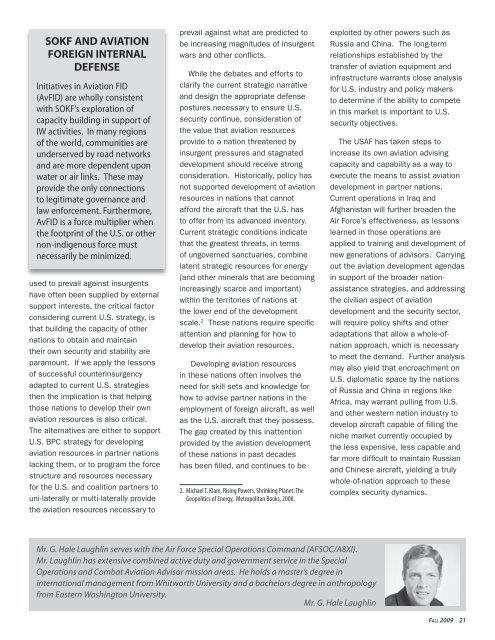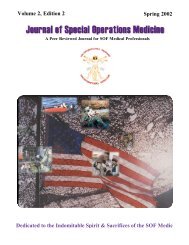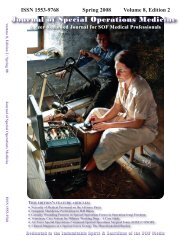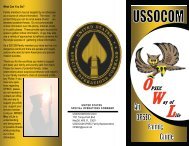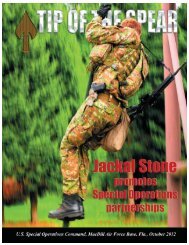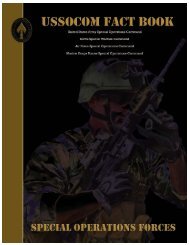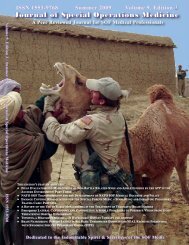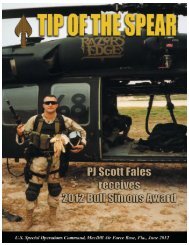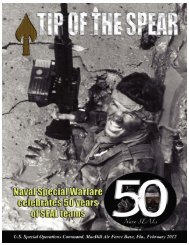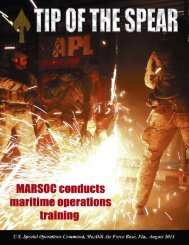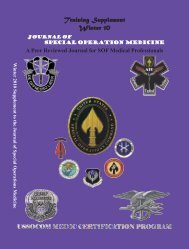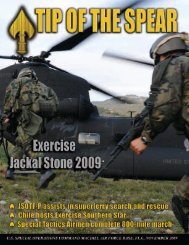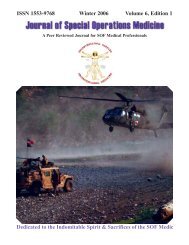Horizons - United States Special Operations Command
Horizons - United States Special Operations Command
Horizons - United States Special Operations Command
- No tags were found...
Create successful ePaper yourself
Turn your PDF publications into a flip-book with our unique Google optimized e-Paper software.
SOKF AND AVIATIONFOREIGN INTERNALDEFENSEInitiatives in Aviation FID(AvFID) are wholly consistentwith SOKF’s exploration ofcapacity building in support ofIW activities. In many regionsof the world, communities areunderserved by road networksand are more dependent uponwater or air links. These mayprovide the only connectionsto legitimate governance andlaw enforcement. Furthermore,AvFID is a force multiplier whenthe footprint of the U.S. or othernon-indigenous force mustnecessarily be minimized.used to prevail against insurgentshave often been supplied by externalsupport interests, the critical factorconsidering current U.S. strategy, isthat building the capacity of othernations to obtain and maintaintheir own security and stability areparamount. If we apply the lessonsof successful counterinsurgencyadapted to current U.S. strategiesthen the implication is that helpingthose nations to develop their ownaviation resources is also critical.The alternatives are either to supportU.S. BPC strategy for developingaviation resources in partner nationslacking them, or to program the forcestructure and resources necessaryfor the U.S. and coalition partners touni-laterally or multi-laterally providethe aviation resources necessary toprevail against what are predicted tobe increasing magnitudes of insurgentwars and other conflicts.While the debates and efforts toclarify the current strategic narrativeand design the appropriate defensepostures necessary to ensure U.S.security continue, consideration ofthe value that aviation resourcesprovide to a nation threatened byinsurgent pressures and stagnateddevelopment should receive strongconsideration. Historically, policy hasnot supported development of aviationresources in nations that cannotafford the aircraft that the U.S. hasto offer from its advanced inventory.Current strategic conditions indicatethat the greatest threats, in termsof ungoverned sanctuaries, combinelatent strategic resources for energy(and other minerals that are becomingincreasingly scarce and important)within the territories of nations atthe lower end of the developmentscale. 2 These nations require specificattention and planning for how todevelop their aviation resources.Developing aviation resourcesin these nations often involves theneed for skill sets and knowledge forhow to advise partner nations in theemployment of foreign aircraft, as wellas the U.S. aircraft that they possess.The gap created by this inattentionprovided by the aviation developmentof these nations in past decadeshas been filled, and continues to be2. Michael T. Klare, Rising Powers, Shrinking Planet: TheGeopolitics of Energy, Metropolitan Books, 2008.exploited by other powers such asRussia and China. The long-termrelationships established by thetransfer of aviation equipment andinfrastructure warrants close analysisfor U.S. industry and policy makersto determine if the ability to competein this market is important to U.S.security objectives.The USAF has taken steps toincrease its own aviation advisingcapacity and capability as a way toexecute the means to assist aviationdevelopment in partner nations.Current operations in Iraq andAfghanistan will further broaden theAir Force’s effectiveness, as lessonslearned in those operations areapplied to training and development ofnew generations of advisors. Carryingout the aviation development agendasin support of the broader nationassistancestrategies, and addressingthe civilian aspect of aviationdevelopment and the security sector,will require policy shifts and otheradaptations that allow a whole-ofnationapproach, which is necessaryto meet the demand. Further analysismay also yield that encroachment onU.S. diplomatic space by the nationsof Russia and China in regions likeAfrica, may warrant pulling from U.S.and other western nation industry todevelop aircraft capable of filling theniche market currently occupied bythe less expensive, less capable andfar more difficult to maintain Russianand Chinese aircraft, yielding a trulywhole-of-nation approach to thesecomplex security dynamics.Mr. G. Hale Laughlin serves with the Air Force <strong>Special</strong> <strong>Operations</strong> <strong>Command</strong> (AFSOC/A8XI).Mr. Laughlin has extensive combined active duty and government service in the <strong>Special</strong><strong>Operations</strong> and Combat Aviation Advisor mission areas. He holds a master’s degree ininternational management from Whitworth University and a bachelors degree in anthropologyfrom Eastern Washington University.Mr. G. Hale LaughlinFall 2009 21


